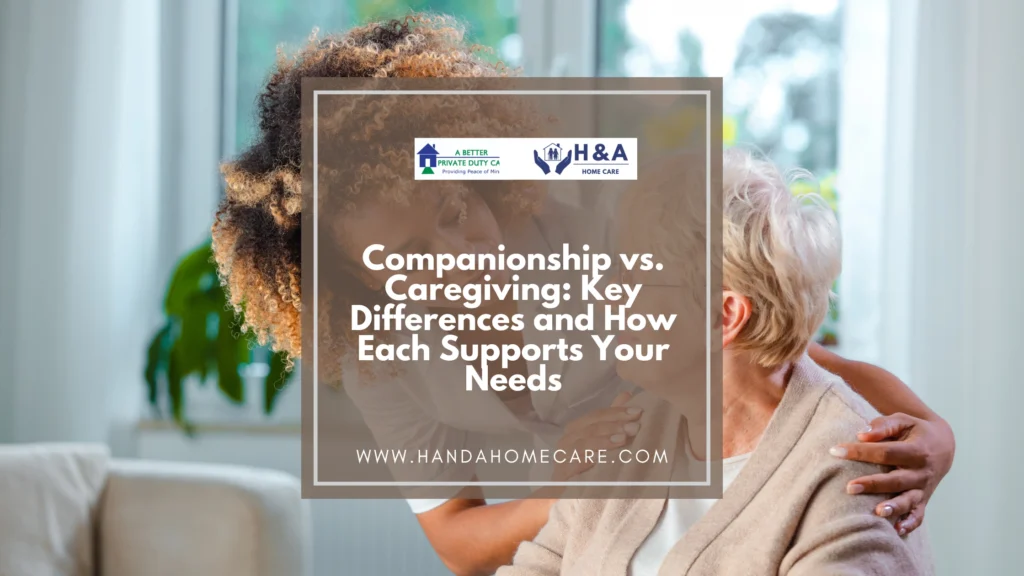As our loved ones age, ensuring they receive the right support becomes increasingly important. However, when it comes to elder care, the terms companionship, and caregiving often create confusion. Understanding the difference between the two is essential for making informed decisions about structured family caregiving, private caregivers for elderly relatives, and elder care companion services. In this blog post, we clearly define what each role entails, highlight their differences, explore real-world scenarios, and guide you in choosing the right support for your family’s unique needs.
Companion Assistance and Companion Caregiver Explained
Companion assistance focuses primarily on providing emotional support and social interaction. Unlike caregivers, companions do not offer medical care or personal hygiene assistance. Their role centers on enhancing a senior’s quality of life through meaningful interaction and companionship. Typical duties of a companion include engaging in conversation and recreational activities, assisting with light housekeeping, preparing light meals, offering transportation to appointments or social events, and reminding about medications without administering them.
For example, Mrs. Thompson, an active 78-year-old, feels lonely after her friends moved away. A companion visits her three times a week, plays cards, accompanies her to the park, and helps her grocery shop. Over time, their bond grows into a source of joy and motivation for Mrs. Thompson, who now looks forward to her social engagements and outings.
A companion caregiver bridges the gap between social companionship and limited caregiving. While not a medical professional, a companion caregiver often provides more practical support than a pure companion, including helping with mobility within the home, assisting with light exercise routines, and monitoring general health without performing medical tasks.
What Companionship Offers
Companionship offers seniors several invaluable benefits that contribute to their emotional, cognitive, and mental well-being. Emotional support helps reduce feelings of isolation and loneliness, which can have severe consequences if left unaddressed, such as depression and anxiety. Cognitive stimulation from regular conversations, games, puzzles, and activities can keep the mind sharp, delaying the onset of cognitive decline.
Moreover, having personal care assistant around enhances safety by reducing the risk of falls and accidents. Companions can observe and alert family members or healthcare professionals about subtle changes in a senior’s behavior or health, enabling early intervention. Especially when structured family caregiving is part of the plan, incorporating elder care companion services ensures seniors maintain a fulfilling and dignified life, filled with purpose, dignity, and respect.
Caregiving: Beyond Companionship Care
While companionship focuses mainly on social and emotional support, a caregiver provides a broader range of personal care and health-related services. Caregivers play a vital role in assisting with daily activities that seniors might find challenging. Typical caregiver responsibilities include assisting with bathing, dressing, grooming, managing medications, preparing meals according to dietary restrictions, helping with mobility and transferring, and monitoring vital signs and reporting concerns to healthcare providers.
For instance, Mr. Evans, aged 82, struggles with dementia and needs help dressing, eating, and taking his medication. A caregiver ensures he follows his care plan and maintains as much independence as possible, preventing unnecessary hospitalizations or deteriorations in health.
When comparing a companion and a caregiver, several key differences emerge. A companion primarily focuses on providing social and emotional support, while a caregiver concentrates on physical health and personal care. Companions do not offer medical assistance, whereas caregivers are trained to manage medications and monitor vital signs. Housekeeping responsibilities also differ, with companions handling only light duties, while caregivers may assist with more comprehensive household tasks as a secondary role.
Common Mistakes to Avoid
There are common mistakes families make when choosing between companionship and caregiving. One critical error is assuming a companion can handle medical needs. Companions are not trained for medical care and attempting to have them manage medications or monitor health conditions can jeopardize the senior’s safety. It’s essential to match the professional’s qualifications to the senior’s specific needs.
Hiring a caregiver who provides excellent physical care but neglects emotional support can lead to loneliness and mental health decline. Seniors require holistic care that addresses both physical and emotional dimensions.
How Companion Services and Family Caregiving Programs Help
Structured family caregiving programs that include companion services provide a holistic approach to elder care. These programs acknowledge that caregiving is multifaceted, requiring emotional support, physical assistance, and medical management. Combining professional caregiving with elder care companion services creates a complete support system that addresses all aspects of a senior’s life.
The benefits of combining services are extensive: it relieves family members of constant caregiving duties, allowing them to balance personal responsibilities with care. It provides seniors with well-rounded support, ensuring their emotional, social, and medical needs are met.
Family caregiving programs often offer flexible plans tailored to the unique needs of each family. Many private caregivers for elderly clients specialize in creating hybrid care models that integrate companionship and caregiving. This personalized approach ensures that seniors receive support precisely when and where they need it most, preserving their autonomy and dignity.
Conclusion
Choosing between a companion and a caregiver depends on the specific needs of your loved one. Understanding the distinct roles each plays is crucial for effective structured family caregiving. Whether through engaging conversations, help with errands, or medical care support, private caregivers for elderly individuals can offer a meaningful improvement in quality of life.
Incorporating elder care companion services alongside professional caregiving ensures that seniors not only live longer but also live better. It’s not just about care; it’s about connection, compassion, and commitment to enhancing the life journey of our beloved seniors. Making informed decisions today paves the way for dignified, fulfilling tomorrows for the ones we cherish most.


